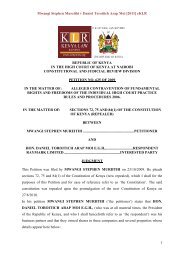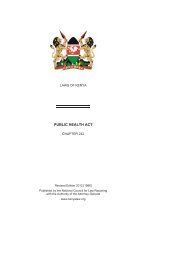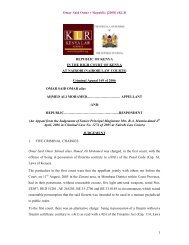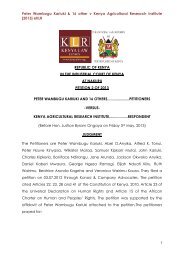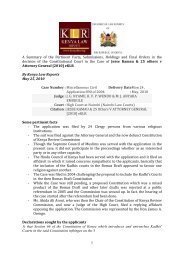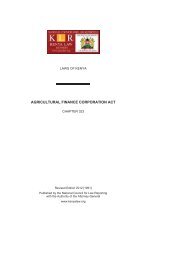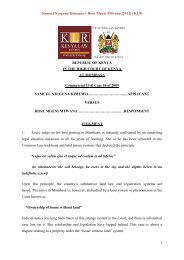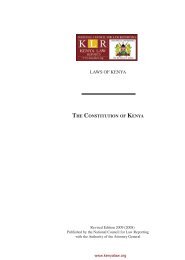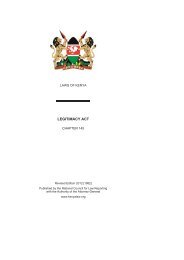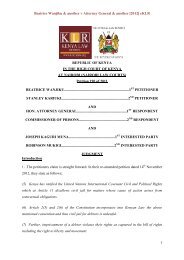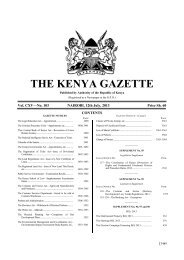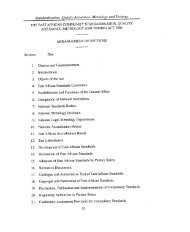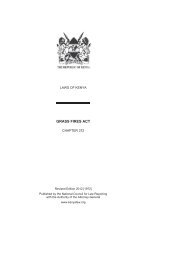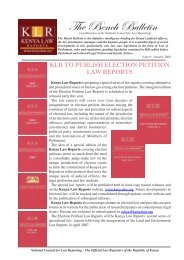the civil procedure act - Kenya Law Reports
the civil procedure act - Kenya Law Reports
the civil procedure act - Kenya Law Reports
You also want an ePaper? Increase the reach of your titles
YUMPU automatically turns print PDFs into web optimized ePapers that Google loves.
Rev. 2010] Civil Procedure CAP. 21 39which <strong>the</strong> original warrant was issued, unless that person shows causeto <strong>the</strong> satisf<strong>act</strong>ion of <strong>the</strong> former court why he should not be so sent orcourt or for satisfying any decree that may be or may have been passedagainst him by that court, in ei<strong>the</strong>r of which cases <strong>the</strong> court making <strong>the</strong>arrest shall release him and shall inform <strong>the</strong> court by which <strong>the</strong> originalwarrant was issued accordingly.(4) Where an application is made to a judge of <strong>the</strong> High Courtthat any person shall be arrested or that any property shall be attachedunder any provision of this Act, and where owing to distance or for executed, it shall be competent for ano<strong>the</strong>r judge of <strong>the</strong> High Court toissue a provisional warrant or order for <strong>the</strong> arrest of <strong>the</strong> defendant or<strong>the</strong> attachment of <strong>the</strong> property upon receipt of such telegraphic or o<strong>the</strong>rinformation as may satisfy him that a warrant or order has been issued:Provided that a person arrested or property attached under <strong>the</strong>provisional warrant or order shall be discharged or released fromattachment unless <strong>the</strong> original warrant or order is produced within suchtime as may seem reasonable.(5) The judge issuing a provisional warrant under subsection (4)original warrant, unless such person shows cause why he should notat such place as aforesaid or for satisfying any decree that may be ormay have been passed against him, in ei<strong>the</strong>r of which cases <strong>the</strong> judgeordering <strong>the</strong> arrest shall release him and shall inform <strong>the</strong> judge by whom<strong>the</strong> original warrant was issued accordingly.86. (1) The language of <strong>the</strong> High Court and of <strong>the</strong> Court ofAppeal shall be English, and <strong>the</strong> language of subordinate courts shallbe English or Swahili.Language of courts.17 of 1967, s. 41,14 of 1977, Sch.(2) (Deleted by 17 of 1967, s. 41.).(3) Written applications to <strong>the</strong> High Court and to <strong>the</strong> Court ofAppeal shall be in English and to subordinate courts in English orSwahili.87. (1) Any court may in any cause or matter pending before itin which questions may arise as to <strong>the</strong> laws or customs of any tribe,caste or community, summon to its assistance one or more competentassessors, and such assessors shall attend and assist accordingly.Assessors.(2) In any Admiralty or Vice-Admiralty cause of salvage, towage



